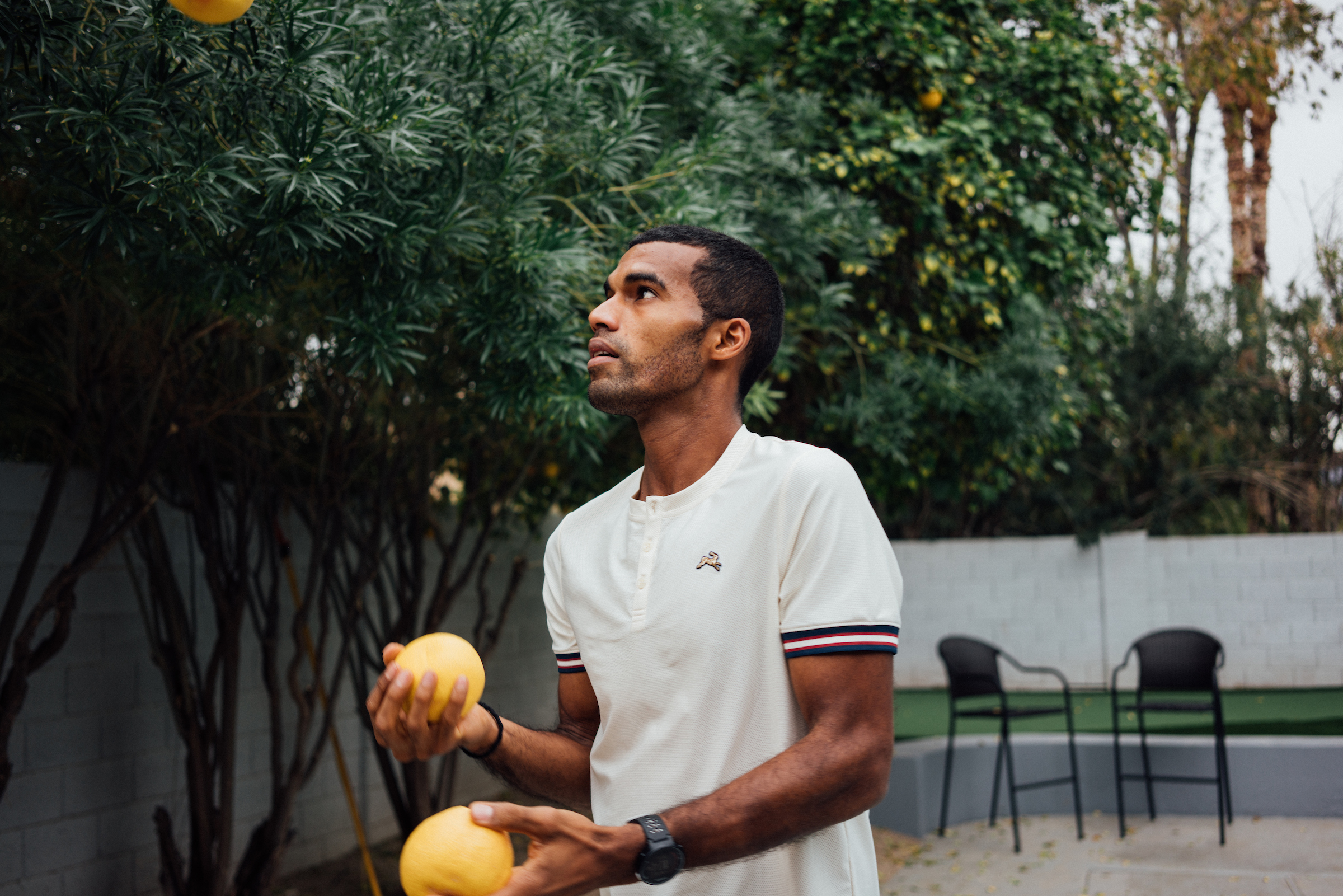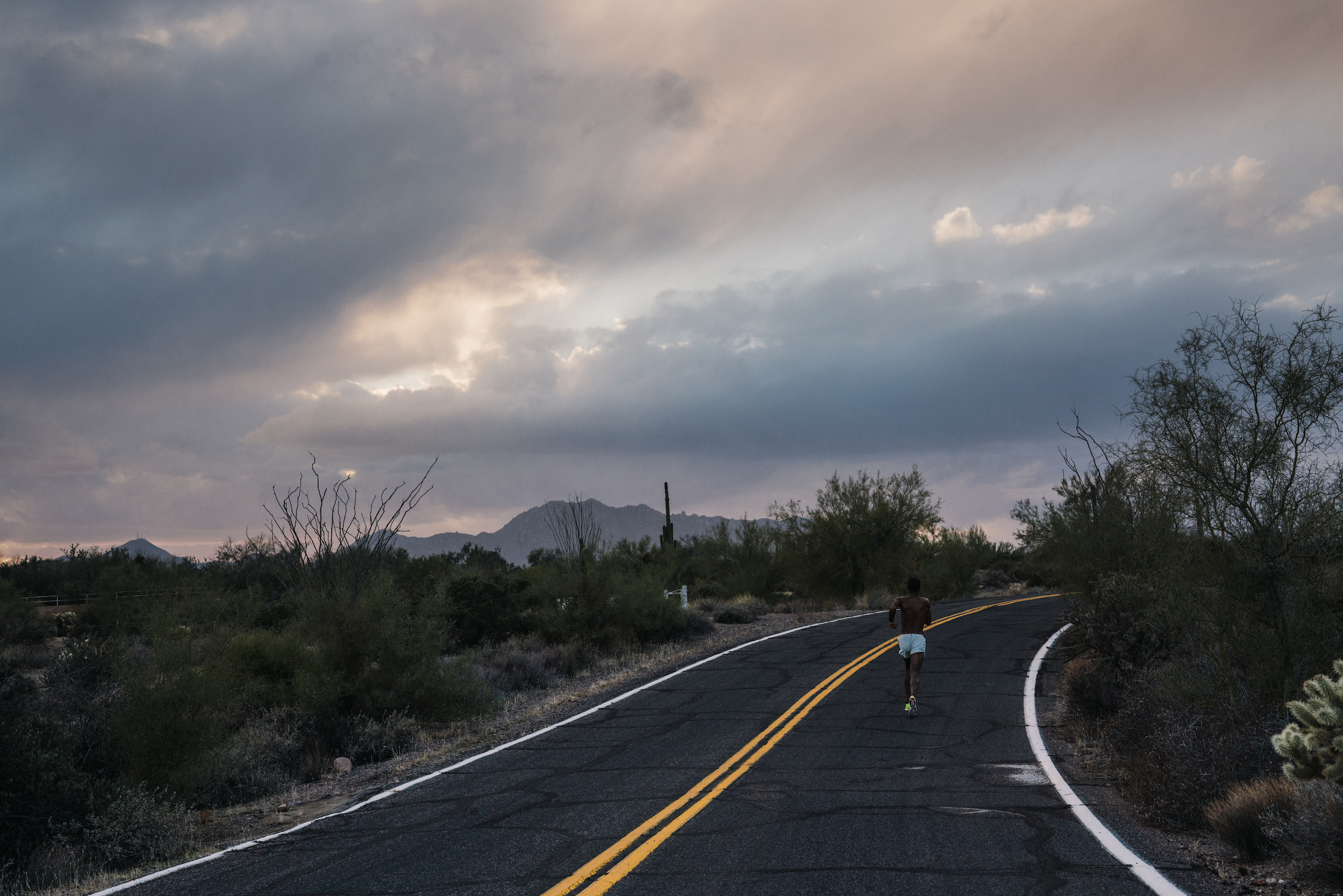
ON THE ROADS
WITH RUBEN SANÇA
Ruben Sança is a man of many talents. A 2012 Olympian for Cape Verde in the 5k, he works full time in finance at UMass Lowell all while training for the marathon and coaching. As if all that wasn’t enough, he recently launched the Sança Foundation, a non-profit dedicated to integrating sports, academics and life skills training for youth in Cape Verde.
Ruben joined us at our spring training camp in Arizona as part of his training for the 2018 Boston Marathon. We sat down with him to discuss his approach to training, how he balances his training, professional and philanthropic goals and his racing philosophy.
What’s your spring racing schedule looking like?
R.S: I’m doing Boston and I’m racing a half marathon in my hometown. It’s the first race the island has organized with the running federation in Cape Verde. And the first race of this kind of magnitude that’s ever been held there. Otherwise, I’ll be back in New England for a 10 miler in Amherst and then doing the New Bedford Half and a local 15k before Boston.
What are your goals for spring racing?
R.S: My goal for Boston is top 20. I’ve been 21st in 2014 and 24th in 2015. But you never know what might happen. In 2014, the year Meb won, there was a crazy field. All the Americans did well, but a lot of East Africans didn’t finish. You have to run smart because you never know how things will play out on the course.
I’ve done two Bostons. 2018 will be three. The first one I finished 21st, I wanted to be 20th. I actually finished 22nd, but some runners have been disqualified since. So top 20 at Boston would be really nice. But top 25 I would be pretty happy. I’ve had good races at Boston, which helps me feel calm. Calm but confident. (Editor's Note: In the unrelenting conditions, Ruben wasn't able to finish the race. He remains sanguine about the outcome, 'The positive side for me at Boston was helping share the pace with my friend Dan Vassallo who went on to finish 10th.')
What does running smart mean when it comes to Boston?
R.S: It helps that I am really familiar with the course, since I’ve been running it since college. I try and stay as relaxed as possible in the first half. Then I try and really work on Heartbreak Hill.
The last three miles of the course, I have to focus a little bit more. Coming through Cleveland Circle, is where I usually lose it. So it’s just about being aware of these places where there are opportunities or potential challenges and preparing mentally to handle them.
What do you like about road racing?
R.S: It’s pretty simple, there are more opportunities on the roads. After I left college, as far as track goes, there aren’t as many opportunities to race and race fast runners. Spring season is short. Competition is better indoors in New England. Then in spring, the roads are just a better place to get more in. Of course, Boston is my favorite because it’s my hometown. I grew up in Dorchester.
Is there a racing moment that stands out to you?
R.S: My first Boston in 2014, I was part of the sub-elite group. So I got to wait in the church near the start with the before the warm up, which meant it was quiet and kind of calm.
But when I came through the shoot to the elite start as I was going past all the people in the first coral who were so excited, it finally hit me that this was Boston. It was surreal. I have been watching the race since I was in high school, I used to volunteer at the two mile mark. I remember then, I thought the elites were crazy human beings - they went through the 2 mile in PR time. And here I was, about to race with some of the best in the world.
Can you talk about your foundation?
R.S: The Sança Foundation is a non-profit youth organization focused on integrating sports and academics as the driving forces to make a sustainable impact in Cape Verde. I went to school in the U.S. for high school and college. In the U.S. there is a student/athlete experience and an understanding that athletics can drive positive change in the community. There’s a philosophy that the student/athlete experience has real applications and benefits to you as a person and in our professional life.
I want to bring that mentality to Cape Verde. It doesn’t exist there. You go to school, find a job or if you are very smart, about 1% of students study abroad. Resources are limited. The Sança Foundation is really about fostering the whole student athlete experience and teaching them essential life skills in high school and college. I work at a university and see student runners and their growth during the four years. That’s not something you see a lot of in Africa. I want to bring that experience home.
How do you balance work with training and building the foundation?
R.S: It’s a lot of late nights and early mornings. I have some people here who help me like my fiance and others in Cape Verde who are supporting me, including the running federation, the Olympic Committee and the government. Before I left my island, I had a meeting with the mayor of my hometown who’s really excited about how the foundation is going to influence to exercise. When you don’t have a lot of resources, a little bit of exercise goes a long way. Working with all these different partners is part of my effort to make sure this is something that has legs and can last. You see in Cape Verde so many different charities come in one time, then stop. Ultimately, I want to make sure it’s something that is sustainable.
I always wanted to start a foundation, but like everyone I dream about a lot of things and say, “I’ll do it, maybe later.” I realized that I was important to start this foundation while I am still an athlete, so I can advocate for it while I’m competing. Racing helps me carry the foundation and builds awareness. Running is an essential platform for mission, so if that means losing a little sleep to juggle training and fundraising, I’m ready for it.
